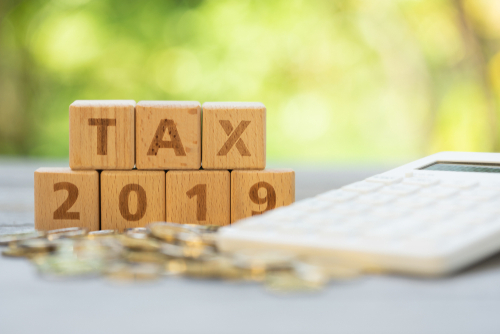“Spend me….”
“Invest me….”
If your tax return could talk, what would it be saying to you?
Most of us hear the first suggestion loud and clear.
Roger that! Here we come Cocktail Fuelled Holiday At Luxury Resort In {insert your favourite destination}!

But the second one is definitely the smarter long-term plan for your money.
A lump sum is the perfect opportunity for a smart investor (or experienced one for that matter) to get in the game, it definitely solves the “I don’t have the money to start investing” conundrum.
Thanks to the taxman, now you do, so let’s get started!
Have a plan for your tax return before it hits your account
Before the refund even hits your account, make a decision on how you plan to invest it.
Don’t think of it as ‘free money’ or it will slip through your fingers in about the same amount of time it takes to fill a shopping cart on Amazon Prime. Quickly.
You’ve actually worked hard for this money so get it to work hard for you!
Keep it simple and choose an investment that resonates with you
My advice for smart investors? Don’t overcomplicate your first investment decisions.
Making things complicated leads to procrastination and your first few investments are actually more about getting started than the dollar amount you have to invest.
Whether it’s $100, $5,000, or $10,000; the key is to begin!
Choose a simple investment vehicle or one that really resonates with you. By investing in a company or industry you’re familiar with, you’re more capable of assessing the competitive climate and a company’s strengths and weaknesses.

Billionaire Warren Buffett calls this the ‘circle of competence’ and recommends using it as a guide to making smart long-range investing decisions. Investing wisdom from Mr. Buffett is always worth listening to.
Let’s take a look at a few investing options you could consider for your tax return –
Exchange Traded Funds (ETFs)
ETFs track an asset or market index and fluctuate in value depending on the market or index they are tracking. An example is the Vanguard Australian Shares Index ETF (VAS) which tracks the ASX200 Australian share index. They’re a low-maintenance, cost-effective way to get started investing and receive returns that contain both income and capital growth.
You can find an ETF for almost anything that you want to invest in from tech to healthcare and property. Yep, even if you only have a small amount to get started, you can still get involved in the property market!
Term deposit or high-interest savings account
Term deposits and high-interest savings accounts are both good, simple options to invest for short-range financial goals. High-interest savings accounts can now bring returns around 3-5% annually and term deposits pay a fixed rate of interest within a fixed time frame.
For example, a term deposit might offer a rate of 4.4% over a fixed period of 5 years.
For my Aussie readers, you can compare term deposit rates and high-interest savings accounts on comparison sites like Finder.com. There should be something similar in your market that provides the same comparisons.
Buy gold
Risk and uncertainty are part of any investment but gold makes a pretty solid foundation to stabilise a portfolio and provide long-term gains. A cost-effective way for beginners to get into the gold market is to buy Gold-backed ETFs which can be bought and sold in very small quantities.
The alternative is buying actual bullion and coins which is more expensive but you own a tangible asset and avoid the counterparty risks associated with Gold backed ETFs. I dig into more detail about investing in gold in this post here.
Property
Your tax return could contribute a chunk of money for property investment or kick off saving a deposit for a first investment loan.
Obviously, direct investments in property require much larger starting balances, so your tax return may not be enough to get started…
But it could be a great starting point. Especially if you have an existing home where you could draw on the equity to make up the deposit required.
I talk about how that can work in this video.

Investment tax benefits…don’t believe the hype?
A word of caution when it comes to property and tax benefits…
Don’t get caught up in the promotional hype about the tax benefits of an investment. It needs to stack up financially before the tax benefits to deserve you putting your money into it.
There are lots of overhyped property investments that sprout the tax benefits that do not make the returns projected, so be careful where you put your own tax return funds when it comes to these promotions.
Plan for future refunds to be added to your investing plan
How do you create a richer future you? By investing one tax return at a time.
Investing a single tax return isn’t exactly going to make you a millionaire, but investing it year after year…after year….can. Consistency, patience, and long-term vision – that’s what it takes to build real wealth and financial independence.
If you’ve never invested before, using your tax return is a great place to start or, if you’re already investing, take the opportunity to boost your usual contribution. Either way, let compounding do its thing over time and your tax return amounts will be worth a whole lot more.
Your future financial self will thank you for it.
If you are just getting started, you’ll want to check out my post on 5 things every beginner investor should avoid.
So tell me, how do you plan to use your tax return?
Is that trip to {insert your favourite destination here} still calling your name? Or will it be making your first investment?
